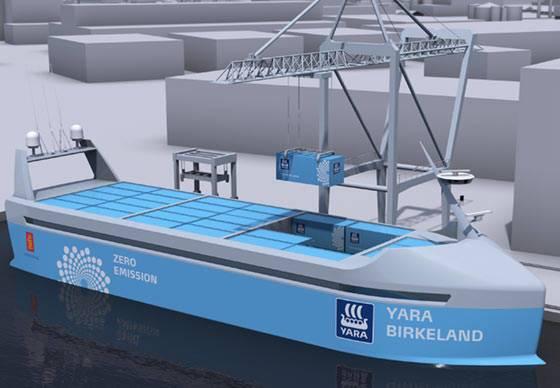
You have heard a lot about self-driving cars lately, and perhaps some noise about the occasional autonomous semi-truck; after all, autonomous shipping along U.S. highways is reportedly Tesla's next venture. Now two companies in Norway are joining forces to launch what they say will be the first zero-emissions ship that will also navigate the Scandinavian country's waters driver-less, or should we say, captain-less.
Kongsberg, a defense and maritime company which takes the same name of the town in which it is located, has partnered with the chemical company Yara on this venture.
Their soon-to-be finished product is the Yara Birkeland, an open-top shipping vessel that will be able to haul anywhere from 100 to 150 shipping containers. At 230 feet long, 49 feet wide and 30 feet deep (in metric, 70x15x12 meters), this ship will be able to move anywhere from six to 10 knots per hour. Yara and Kongsberg say the ship's electric propulsion system will be powered by a battery system with the might of 4 megawatt hours, or the equivalent of 40 automobile engines.
Making this ship stand out even more is the companies' insistence that this vessel will eventually operate fully autonomously. Plans call for the Yara Birkeland to haul goods between the ports of Porsgrunn, Brevik and Larvik. Company executives told one design publication that the ship will replace up to 100 daily diesel-fueled trucking hauls.
Reports say that the first trips next year will be staffed, but in 2019, the ship will be controlled manually, with complete autonomy occurring at some point in 2020. Three various operations centers will monitor the ship's performance, and loading and unloading the vessel will occur automatically using electric cranes and other equipment. The Yara Birkeland's mooring system will function autonomously as well.
If this project becomes reality, it will be a huge step forward for the United Nations, which has called for improved environmental stewardship of the world's oceans, even as it acknowledges that maritime shipping is overall the most efficient means of moving goods across the globe. Global shipping is projected to triple by 2030 from 2000 levels, and is projected to account for 17 percent of global emissions by 2050.
Goal 14 of the UN's Sustainable Development Goals (SDGs) calls for maritime resources to be harnessed in order to protect the high seas. While this SDG is focused on ecological issues such as ocean acidification, many maritime companies have publicly embraced Goal 14 as part and parcel of the sustainability and corporate responsibility agendas. The shipping giant Maersk, for example, has said it will comply with international maritime organizations' directives to cap sulfur oxide and nitrogen oxide emissions over the next several years.
Environmental agencies worldwide say such measures are necessary in order to reduce the risks of ocean acidification, which has long been linked to ships' emissions. Depending on the source cited, maritime transport is responsible for approximately 2.5 percent of emissions worldwide. But as more countries ink trade agreements, some estimates have suggested that ratio could surge to as high as 17 percent if left unchecked. The bunker fuel used by many ships is the big culprit, as it has an exponentially higher sulfur content than the fuel used for road transport, according to a report in Scientific American.
Cooperation between maritime companies, however, has proven to be an easy talking point. As pointed on publications including the Guardian, any agreement has been difficult to achieve in practice. The shipping industry is the only worldwide sector not subjected to any global climate change goal. Policy makers have often lost patience with logistics trade groups including the International Maritime Organization, which has pledged to agree on limits to the amount of sulfur in fuel. Current levels of sulfur in bunker fuel can be as high as 3.5 percent; by 2020 that level will be limited to 0.5 percent, though many companies had hoped to delay that deadline to 2025.
We are still in the wild west of autonomous vehicles and vessels, so all eyes will be looking north towards Norway - which itself is an oil-rich nation that has pledged its own ambitious sustainability plan, only to be criticized to being sustainable at home while simply exporting its carbon emissions abroad. If this ship can deliver what Kongsberg and Yara have promised, we could eventually live at a time when we will feel a tad less guilty about ordering goods online; most of which, of course, are made overseas.
Image credit: Kongsberg

Leon Kaye has written for 3p since 2010 and become executive editor in 2018. His previous work includes writing for the Guardian as well as other online and print publications. In addition, he's worked in sales executive roles within technology and financial research companies, as well as for a public relations firm, for which he consulted with one of the globe’s leading sustainability initiatives. Currently living in Central California, he’s traveled to 70-plus countries and has lived and worked in South Korea, the United Arab Emirates and Uruguay.
Leon’s an alum of Fresno State, the University of Maryland, Baltimore County and the University of Southern California's Marshall Business School. He enjoys traveling abroad as well as exploring California’s Central Coast and the Sierra Nevadas.














